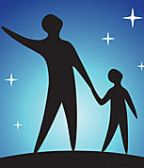
The United Nations declared 2009 the International Year of Astronomy marking the
work of Galileo and the first astronomical telescope 400 years ago.
Galileo (1564-1642) promoted the views of Copernicus who theorized that the sun
was at the centre of the solar system, with the planets, including the earth,
orbiting around it. This was in contrast to the Ptolemaic system, adopted as
Christian doctrine for more than a thousand years, that the earth was the
stationary centre of the universe, with the planets moving in orbits within
concentric spheres.
His close observations of the moon and planets, and the moons of Jupiter with
the 20 power telescope he built confirmed his thinking. In 1632 he published
Dialogues concerning Two Great World Systems but the Inquisition process banned
its sale. In 1633 he was tried as a heretic, forced to recant, sentenced to life
imprisonment, later changed to house arrest, for promoting a theory dangerous to
organized religion.
He lived in Florence (Italy), the hotbed of the Renaissance in the 14th to 16th
centuries, the locus of the revival of interest in classical antiquity,
humanity, arts, sciences and philosophy. Some of the key players were Dante,
Botticelli, Raphael, Leonardo da Vinci and Michelangelo. This amazing period of
vitality virtually ended with the new rules of the Council of Trent leading to
the condemnation in Rome in 1600 of Giordano Bruno, one the most original
philosophers.
The culture of ancients was the inspiration for the golden age
(Renaissance/Rebirth) bringing new life and light to the 1000 years of
intellectual and spiritual stagnation known as Europe's Middle or Dark age. Once
again the virtues of Beauty, Truth, Justice were pursued and fundamental freedom
and responsibility nurtured.
Today as we probe the depths of the material universe, we need again to reach
back to our philosophical and spiritual roots in antiquity, East and West, to
gain a second birth lest we slip into the abyss of a darker age oblivious of the
path to true happiness, dignity, serenity, and knowledge of ourselves.